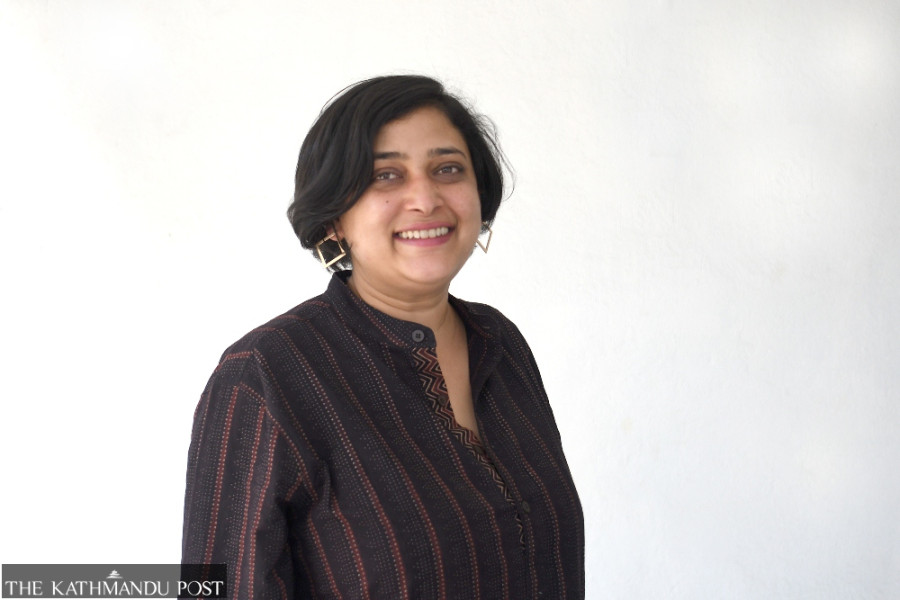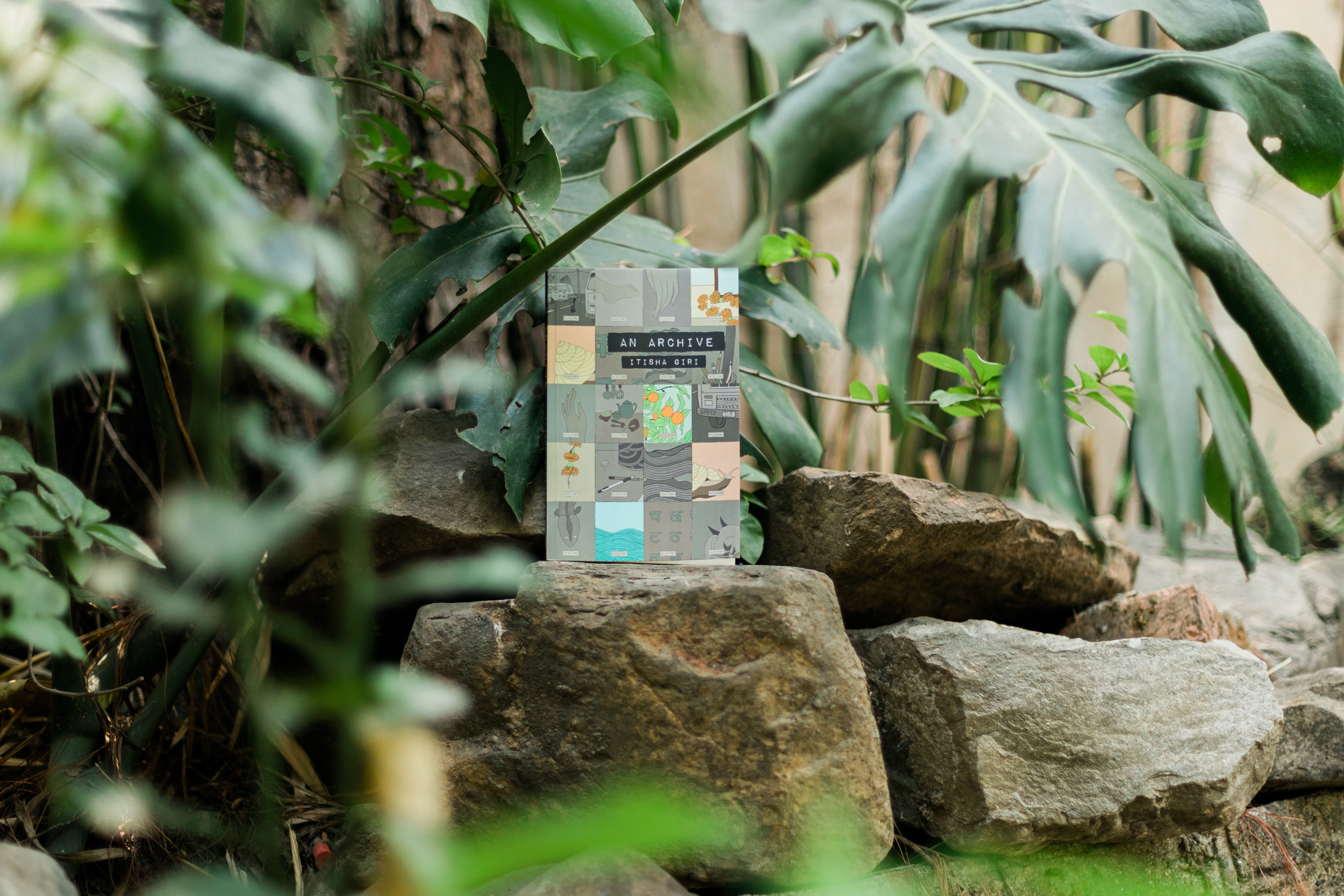Culture & Lifestyle
‘Poetry allows you to observe things’
There is much to decode about poetry with poet and podcaster Itisha Giri. She recently came out with ‘An Archive’ full of her poetic verses to share with the world.
Srizu Bajracharya
Poetry can mean anything to anyone. Like a piece of art, a poem’s meaning can change depending on the person reading it. That is usually the case unless a poet wants the work to be read in a certain way, says Itisha Giri, a poet and podcaster. Giri, who launched her first poetry book, ‘An Archive’, last week, is sure that people will perceive her poems differently from how she sees them. She knows very well that they will take on their own form for different people.
Giri, who is also the co-creator and producer of the popular feminist podcast ‘Boju Bajai’, has been writing poetry for the last 12 years. Her poetry has appeared in different literary magazines and anthologies. She is also the editor of ‘These Fine Lines’, a poetry collection by young women poets.
In ‘An Archive’, Giri brings 37 poetic verses, sometimes as herself and sometimes as an observer of events. She touches on a range of subjects, from the sounds and feelings missing in our everyday language, memories of people who have left, the cultures surrounding death, to how language plays with power and how a word connoisseur can use that very language to deconstruct that control.
In this conversation with the Post’s Srizu Bajracharya, Giri talks about her journey as a poet, her love for words, the inside and outsides of poetry writing, and how poetry makes a difference.
Let’s start with your journey into poetry. When did you start writing poems?
When I was studying at Budhanilkantha School, I used to participate in a lot of poetry reciting competitions, where we had to memorise someone else’s poems. And as a child, I was really into the poems’ rhythm, melody, and repetition. For some reason, I just enjoyed reading poetry aloud. I remember when I read Bhupi Sherchan’s poetry collection ‘Ghumne Mechmathi Andho Manche’ I was in awe of the interplay of words.
Later, when I went to the UK for my higher studies, I started reading anthologies like ‘Staying Alive’ and ‘Being alive’, both of which are a collection of poems [from a mix of contemporary poets] responding to certain feelings. Those collections were really important to me. But I [intentionally] started reading English translations of Nepali poems like Professor of Nepali and Himalayan Studies Michael Hutt’s ‘Himalayan Verses’ and then Manjushree Thapa’s translations of Nepali poems written by women poets in Nepali Times columns.
I was always drawn to works of socially engaged poets, and for me, the fact that poetry could respond to injustices and could create conversations around injustices was just so impressive. Realising poetry could create urgency and immediacy as well played into my interest in writing poetry. And I was introduced to those realisations because I read works of poets like Sylvia Plath, Anne Sexton, Meena Kandasamy, Kamala Das, and Sharon Olds. Their social engagement with poetry pulled me into writing my poems.
I wrote my first poem when I was 10; it was about a lost cat and my childish attempt to be a poet. But it wasn’t until twelve years ago that I started writing poetry with the intent of publishing them.
And now I just enjoy writing poetry. It’s a painful process, but I think it allows you to observe things and respond to events. For me, poetry is a sort of the perfect medium to bring all my experiences and feelings together. When I write poetry, I feel I can stay true to a moment or to an image in time. And when I feel I have managed to capture whatever is in my head, there is nothing as fulfilling as that moment.
How should a poem be read?
There is no one way of reading poetry. A friend of mine asked me the same question because he feels intimidated by the genre of poetry. A lot of people think poetry is not for them. But we are just thinking too much. I think the way to read poetry is however you read anything. And each time you read it, you will begin to see different things. Maybe in the first reading, the images might resonate with you, you might find an idea that strikes you, or you might just like the rhythm and the melody the poem carries.
And sometimes, if that poem appeals to you, you might want to go back to it and read it the second time. And when you do that, different things might emerge again. Everyone engages with poetry differently, so I think we should approach poetry with an open mind. We should not be thinking that we should feel a certain way going into a poetry book. Poetry is more about your relationship and your engagement with the text. There are no rules, and I think it’s just whatever feels good to you. Go into poetry with the way it invites you.
Some of your poems in the collection demand people to read from the poet’s perspective instead of relating to one’s own experience. Was that something intentional? Most people think poetry should be relatable, but what was your approach with your poetry in the book?
There are different poems in the collection, and not all of them ask readers to follow my insight. This collection has more to do with time and memory. And throughout these poems, there is also an interplay between the internal and the external—of me looking at my experiences and understanding and me looking out at the experiences and understandings happening in the world and around me. Depending on the poem, you might feel differently. In some poems, I am lingering in the present and looking out to be aware of what’s around me, which might be the social-political climate or a certain incident. But when I am looking in, I am moving between the past, present, and future.
In some of my poems, I am looking at the past and remembering things—and remembering itself is distorting and defies the order of things.
I have written these poems sitting uncomfortably between the inner and outer worlds I am looking at. Some of the poems in the book were written spontaneously, and some of them took a lot of time.

If we read between the lines of many of your poems, we can get a sense of the feminist understanding and how patriarchy works. Is that something you have consciously weaved into your poems?
When I write poems, my words come from a place that is being informed by my history, experiences, relationship with places, time, and language, so I am not really thinking I will write a feminist poem because I think that is going to happen anyway. But there are certain poems that I have written to get people to respond to a certain incident, whether it is through shock or awe.
For example, I decided to write ‘When I Have a Daughter’, as a response to the acid attack case that happened in 2015, where two students were splashed with acid when they were going to their tuition classes. I was shocked and angered by the incident, and when the poem came out, a lot of people read it literally. Some of the comments I received were like how can you abuse your daughter like that. They said the poem was a little too extreme.
But that was also the motive: to get people aroused in a way. To make them think as they are reading what is going on here. The entire point of the poem was to make people think about what sort of world we are living in where a lot of parents have to worry about raising their children. And so, with that poem, I was conscious. But the intent is not like I want people to react this way—the intent is like this happened, and I have to respond, and there is an urgency to respond, and I decide what form or structure to respond to it. When you compare ‘When I have a Daughter’ to ‘A Survival Guide for Young Girls’, both have different styles. ‘A Survival Guide for Young Girls’ is written in a narrative style, whereas ‘When I Have a Daughter’ has a dark kind of satire there. So, it is just about where my writing takes me.
Most of your poems are written in free verse. Can we talk about why you prefer free verse poetry?
I think free verse centres your emotions and language first, which gives you certain liberties in making authorial choices. But, at the same time, using constraints, as I have done in ‘An Archive of Consonants’ [one of the poems in the book], allowed me to enter certain crevices of language that I might not have discovered otherwise, which in the end felt very liberating as well.
Does poetry make a difference when it is served in a book format? Was there a reason why you thought you had to bring your collection as a book instead of putting it on the internet or recording it like people do these days?
I wanted this book to have a certain shape and format, which I think would have been impossible if it was not in a book format. If you look at the book’s design, it works like a collage and draws on visual elements. The first poem in the book also works as a marker to be read in a certain way. And I think that would not have been possible if I had just uploaded a PDF file online. Of course, all mediums are wonderful for poetry, but I imagined my book to have a certain design. A lot of thought has been put into the placements of the poems. I had an ideal reader in mind for whom I wanted to frame the poems.
This book has been in the making for the last few years, and it has been a wonderful experience. But I am also ready for whatever happens with this book. I just hope people will enjoy it, and that’s all I can ask for.
The interview has been edited and condensed for clarity.




 22.64°C Kathmandu
22.64°C Kathmandu















